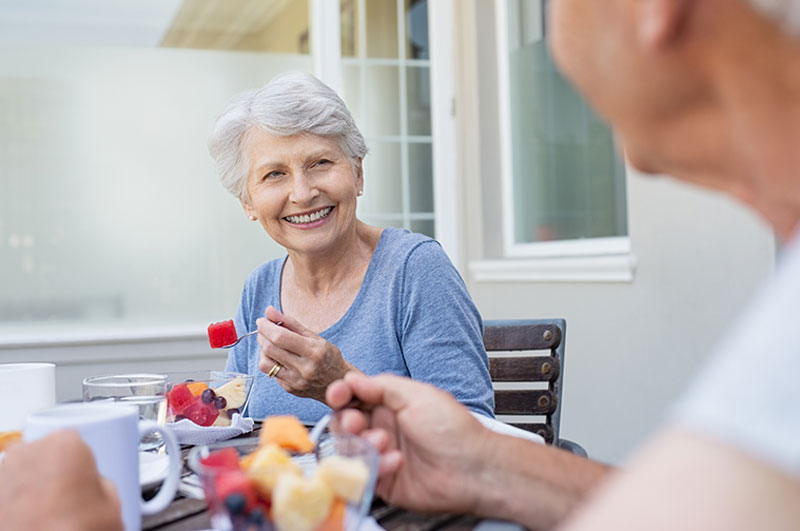
Fiber benefits seniors in many ways, increasing overall health.
If the seniors in your life are more prone to indulge in the various junk and fast food choices that are so readily accessible, they’re in good company. Although these types of foods are fast and easy, they are in many instances full of calories, cholesterol and fat and lack fiber and other essential nutrients that are important to nourish aging bodies. In fact, as few as 5% of us are getting enough fiber – something vitally important for the elderly.
Why Is Fiber So Important?
Fiber benefits include:
- Weight control: Low in calories and slower to digest, foods that are abundant in fiber help us to feel fuller for a longer period.
- Lowered cholesterol: With fiber in the digestive system, the body absorbs lower levels of cholesterol.
- Blood sugar regularity: Because high-fiber foods take longer to be digested, steady blood glucose levels are sustained.
- Better gastrointestinal tract functioning: Fiber in the digestive tract stimulates the intestines, easing problems from constipation.
- Lower cancer risk: Adequate levels of fiber in the diet help protect against certain kinds of cancer, such as colon cancer.
Simple Tips to Boost Fiber Intake
If a senior’s diet is deficient in sufficient quantities of fiber, it is important to incorporate more fiber slowly. Adding a lot of fiber all of a sudden can trigger bloating, gas, and other side effects. Help older adults to build up fiber intake over a few days, while making certain to drink an adequate amount of water as well, which can help cut down on unwanted symptoms.
These high-fiber foods are a good place to start. Bear in mind that ideally, adults should be consuming 14 grams of fiber for every 1,000 calories consumed every day, which translates to approximately 24 grams for females and 38 grams for males.
- Apples (4.4 grams in one raw, medium-sized apple)
- Raspberries (6.5 grams per cup)
- Pears (5.5 grams in one single raw, medium-sized pear)
- Strawberries (3 grams per cup)
- Avocado (10 grams per cup)
- Bananas (3.1 grams in one average-sized banana)
- Carrots (3.6 grams per cup)
- Broccoli (2.4 grams per cup)
- Beets (3.8 grams per cup)
- Brussels sprouts (3.3 grams per cup)
- Artichoke (6.9 grams in a single raw globe)
- Kidney beans (12.2 grams per cup, cooked)
- Lentils (13.1 grams per cup, cooked)
- Chickpeas (12.5 grams per cup, cooked)
- Split peas (16.3 grams per cup, cooked)
- Oats (16.5 grams per cup, raw)
- Popcorn (1.15 grams per cup, popped)
- Quinoa (5.2 grams per cup, cooked)
- Almonds (4 grams per 3 tablespoons)
- Sweet potatoes (3.8 grams per medium-sized boiled potato without skin)
- Dark chocolate (3.1 grams per 1-ounce piece)
With a wide variety of options to satisfy each older adult’s individual taste, it’s very easy to add more fiber to the diet and enhance older adult health.
At Grace Home Care, providers of expert caregivers and home health in Topeka, KS, we understand how a well-balanced diet for older adults helps maintain general health and wellness so that older adults can continue to live active and engaged lives. Our highly-trained care team is here to help promote healthy snacking and eating habits for seniors and provide companionship during meals, and any other time, day or night. Our care team can also grocery shop, plan and prepare healthy and balanced meals and snacks which are tailored to specific dietary restrictions or needs, and even tidy up the kitchen afterwards.
To learn all about the many ways Grace Home Care’s caregivers and home health in Topeka, KS can help an older adult you love maintain healthy eating habits and much more, reach out to us at 785-286-2273 to schedule a free in-home consultation today.
Grace Home Care holds a Kansas Home Health Agency Class B Operating License. Our license number is T-014-047.
